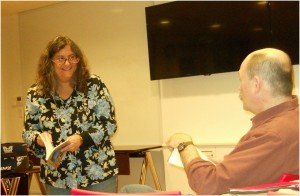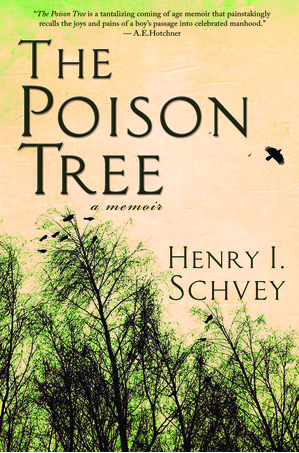Jane Ellen Ibur hosted Writing After War at the St. Louis Library Central Branch
Share the post "Jane Ellen Ibur hosted Writing After War at the St. Louis Library Central Branch"
By Diana Davis

The St. Louis Public Library Central Branch is hosting a series of writing seminars. The seminars were designed to allow service men and women coming home from war fronts to express the trauma that they witnessed and/or lived through which was creating stress in their lives.
For six weeks, participants in these FREE workshops will be able to learn how to write down their thoughts and feelings. Although these writing workshops are geared toward service members and their families, anyone interested in writing may attend. The meetings are being held in the Training Room on the second floor on the Locust side of the Central Branch Library. It is handicapped accessible. All workshops will be guided by St. Louis writing professionals.
Jane Ellen Ibur hosted the first two sessions on January 21 and 28 which were titled: Writing Your Story: Getting Started. Ibur is a poet educator with a wealth of experience in teaching poetry. “I’m a great teacher,” Ibur said, “because my job is to give people a voice, and I know how to do it. Poems tell an emotional truth. It’s not about writing what you know; it’s about emotional truth.”
To begin, Ibur introduced students to clustering. She wrote “RAIN” in a large circle on the whiteboard and then asked for her students to call out words that they associated with rain. As they called out the words, she wrote the words surrounding the main theme. She got a large variety of answers because of the diversity of her students. They called out words like “splatter,” “thunder,” “lightning,” “wind,” “splash,” “moisture,” “dripped,” “pitter-patter,” and more. Ibur then introduced the form of an English Sonnet which consists of of three cross-rhymed quatrains followed by a couplet. She handed out a worksheet with the rhyme scheme letter on the right hand side: quatrain # 1 had the rhyme scheme of a, b, a, b; quatrain # 2 had c, d, c, d; quatrain # 3 had e, f, e, f; and finally, the couplet which had the rhyme scheme of g, g. Ibur provided an example of this form from one of her poems.
“Night of the Blue Trees”
| Wind murmurs in the leaves between the stars. |
a |
| I am missing my hair, missing my youth |
b |
| When my hair would grow the length of my arm, |
a |
| When I was too foolish to know the truth. |
b |
|
|
| Time’s rushing faster, the trees have turned blue. |
c |
| Shadows fading, days all unwound, |
d |
| It’s late afternoon, sky deepening hues. |
c |
| Keep moving forward, refuse to slow down. |
d |
|
|
| I ride a blue train through a blue forest. |
e |
| The cars rattle and rock; I’m trapped inside. |
f |
| Wind in the hollow sings a strange chorus. |
e |
| While day in, day out, I’m changed by the ride. |
f |
|
|
| Filled with conflict reconciliation |
g |
| I clutch my ticket; I near the station. |
g |
“Each of us have a story to tell,” Ibur explained. “Writing poetry is to take an ordinary moment and create something extraordinary.” She gave each of us a blank sheet of paper with only the rhyme scheme written on the right side. Using the words from the RAIN clustering activity on the whiteboard as a jumping off point, we were directed to write a sonnet. “Write as fast as you can. Don’t stop to correct spelling errors. Don’t rethink your word choices. Just write and let the emotions be recorded on the sheet. This is your first draft. You can polish it later on.” We did. Although we all cringed a bit as we read our first drafts aloud, each of us had created a distinct version of a sonnet, as individualized as the readers.
Ibur was emphatic that we need never suffer from writer’s block again. How? Come up with prompts. One prompt is to think of a book title, like What the River Knows. Make that your poem’s title and free-write for 10 minutes and see what you come up with. You have your first draft of a poem. A writer might also use an old or new saying, such as “The Cost of Living—does it outweigh the benefits?” as a prompt. Another creative writing technique is to take three unrelated phrases such as: The light in the ceiling; the nail on the floor, and the sound of the rain. Use the phrase as your first line and quickly write a total of three lines. Write a 9-line free-verse poem. Do not stop to correct anything. You’ll have a first draft of a poem.
Ibur used another technique as well. She walked around the room with a painting. We looked at the painting for 10 seconds and then wrote down 10 of our impressions about the art work. She then handed us a postcard of the painting and gave us 10 minutes to write a free-verse poem. The results were very imaginative and invigorating, and the poems as diverse as the attendees.
Finally, Ibur gave a visual summary of how we should approach writing our first drafts. “This is the year of the Olympic Winter Games in Sochi, Russia. Think of yourselves as members of a bob-sled team. Grab hold of the sled. Run as fast as you can, then jump on board. Once you’re on that track racing, there’s no exit before the end of the ride. Write in this way, and you may find that you have created a first draft of a poem as exhilarating as the Winter Olympics. In fact, you may win a gold medal.”
After the sessions, as we were chatting, Ibur confided that she has a book coming out. It’s called Both Wings Flappin’, Still not Flyin’ (published by Penultimate Press). It’s mostly poetry, although there are a few prose pieces. It will be available in March.
Jane Ellen Ibur calls herself a poet educator, and rightly so. She was a 7th grade teacher before she shriveled under the regimented curriculum. With 35 kids of all different learning levels in one classroom, she felt stifled and ineffective. She quit teaching for a while and accepted other jobs—in an office, at a law firm, and as a bookseller. She found her way back to teaching when she went to work at OASIS, a senior education facility, with her cousin, fellow teacher and poet, the late Marilyn Probe. After conducting a workshop for seniors, Ibur felt a desire to teach the non-traditional, at-risk, non-writer.
As with anyone whose passion leads them into their field of work, she works with zeal. She has participated in over 125 invited and commissioned readings. A long-time co-host of the KDHX radio show, “Literature for the Halibut,” her work has been published in over 160 anthologies and journals. She has taught in non-traditional settings such as the St. Louis County Jail where she has taught on the men’s maximum security floor for twenty-five years. She has also taught at homeless shelters, residential schools, and art museums. In 2004, she was given a Certificate for Excellence in Teaching from the Missouri Scholarship Academy. Ibur directs Poets and Writers Ink for gifted middle and high school students.
She was the 12th poet invited to join the St. Louis Warrior Poet Council. She was presented with the Loretta Award from Webster University for her Humanitarian work with clients such as the Edgewood School for Students with Special Educational Needs and St. Peter and Paul Catholic Church’s Homeless Shelter.
Every Monday night, Ibur teaches (for a fee) adult classes which meet at her home in the Tower Grove East neighborhood. To contact her, or to sign up for her sessions, e-mail her at drjjcowgirl@aol.com. She can also be contacted at Poetsandwritersink@gmail.com.
The next session meets February 11th where the focus will be on using writings from the past to provide insight and history for our stories. February 18th will place its emphasis on storytelling from the interview perspective, and the February 25th session is titled “Building your story from the Ground Up” which will include creating settings and character descriptions. Further writing sessions are planned for the month of March as well. For additional information, please go to: www.slpl.org.


